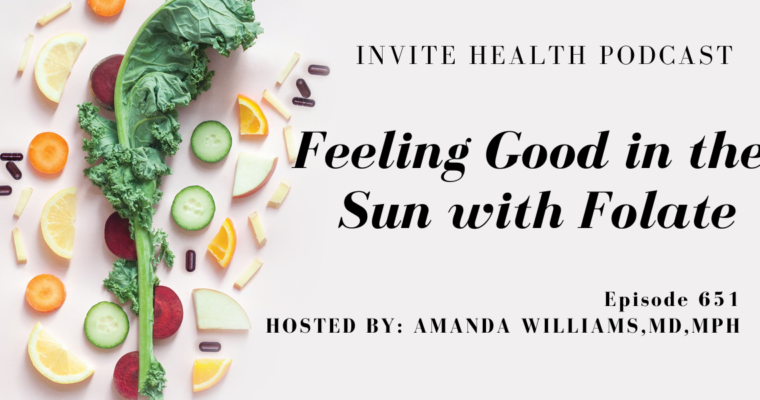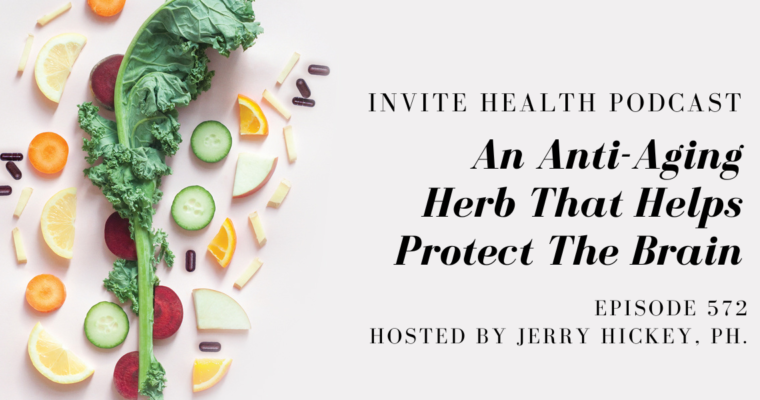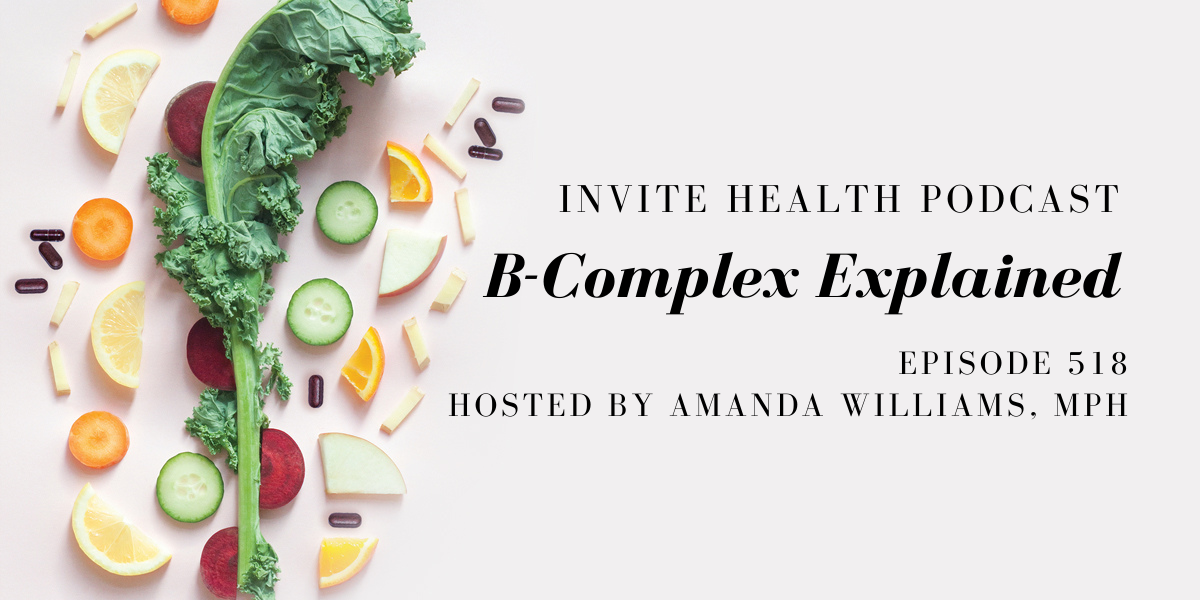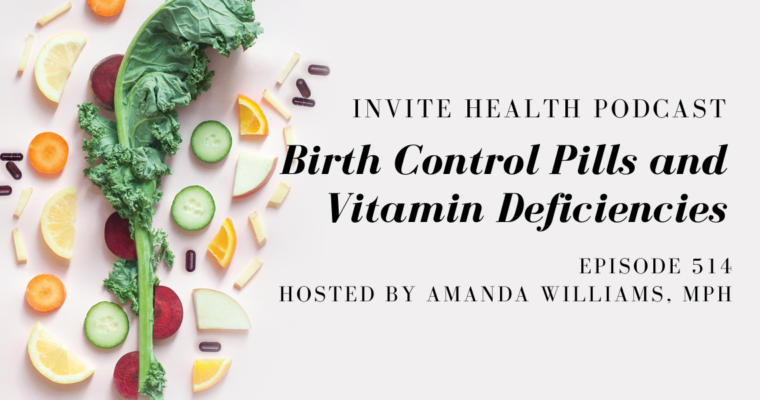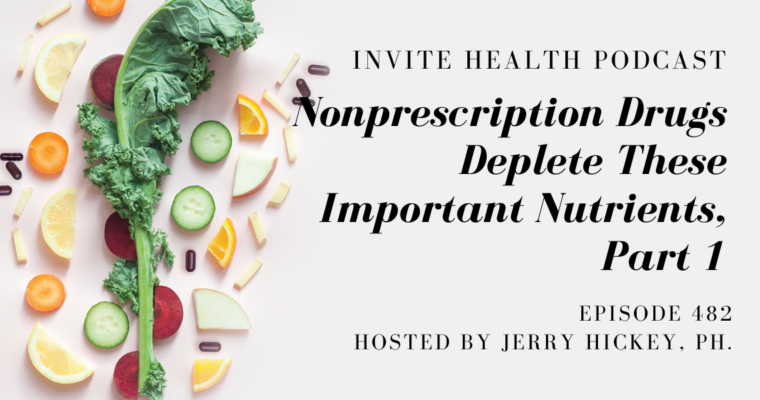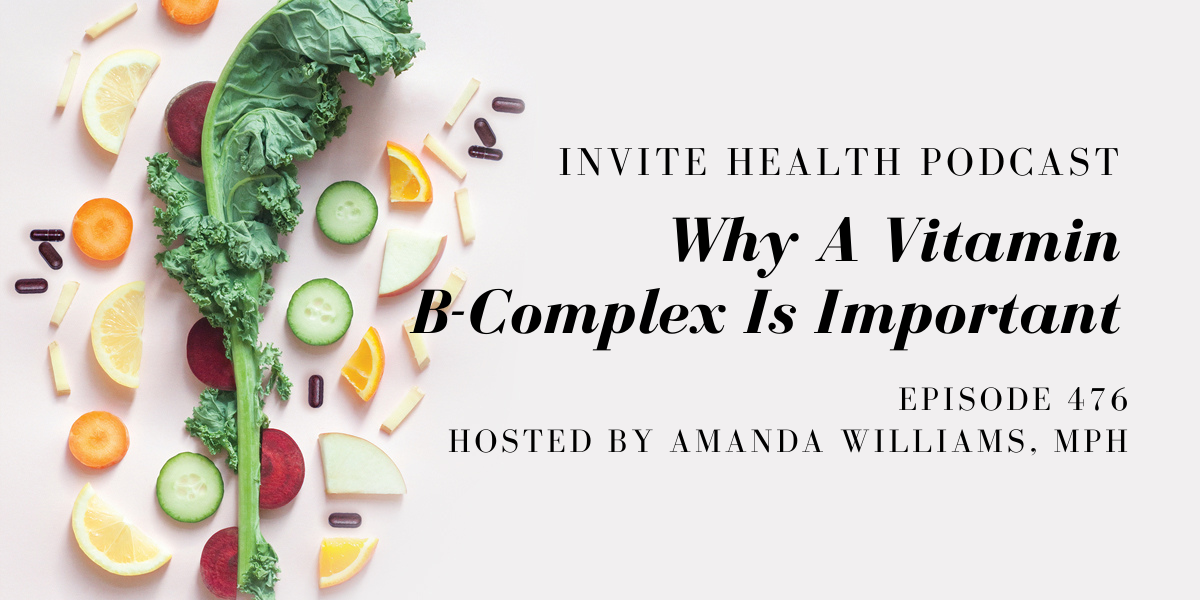B-complex
Subscribe Today!
Please see below for a complete transcript of this episode.
B-Complex Explained – InViteⓇ Health Podcast, Episode 518
Hosted by Amanda Williams, MPH
*Intro music*
InViteⓇ Health Podcast Intro: Welcome to the InViteⓇ Health Podcast, where our degreed healthcare professionals are excited to offer you the most important health and wellness information you need to make informed choices about your health. You can learn more about the products discussed in each of these episodes and all that InViteⓇ Health has to offer at www.invitehealth.com/podcast. First time customers can use promo code PODCAST at checkout for an additional 15% off your first purchase. Let’s get started!
*Intro music*
Amanda Williams, MPH:
[00:00:39] Getting to the basics of a B-complex. This is always a subject that comes up when people are trying to decide if they should do a single B-vitamin or if they should do a comprehensive B-complex. Depending upon what your health concerns are, generally speaking, utilizing a B-complex is going to be the first choice. Now you can still potentially need to add in additional, say, B12 on top of your B-complex. But for the most part, a B-complex should give you that coverage that perhaps you’re not getting from your foods. So I’m Amanda Williams, MD, MPH, and let’s talk about what a B-complex is in general.† [00:01:20]
[00:01:21] So we know that there’s 11 different vitamins that make up a B-complex. So those include Vitamin B1, which is thiamin. Vitamin B2, which is riboflavin. B3 is niacin. Then you have B5, which is pantothenic acid. We have B6, which is pyridoxine. B7 is biotin. We have B9, which is folic acid. B10, which is para-aminobenzoic acid. B12, which is cobalamin and then choline and inositol. So choline and inositol are really very unique in terms of what they do. So I just want to kind of do like a brief overview of each individual B-vitamin and for the most part, how they function in the body. Now, keep in mind, they all have multiple functions, so I’m just going to give you some of the the key ways to which these B-vitamins are utilized, which is why it would make sense to take a B-complex to make sure that we’re getting exposure to all of these Bs.† [00:02:23]
[00:02:24] So we know that B1, which is thiamin, this is involved in many different reactions in the body. So we know that it’s very important when it comes to the synthesis of acetylcholine, so for our memory. We certainly know it’s important when it comes to proper metabolism of thyroid hormones. We know it’s important for nerve function. So a reason why someone would maybe take additional B1 by itself, which would be in our Nerve HxⓇ formulation, would be if they had maybe some concerns with different neuropathies, for example. Or maybe they have, you know, a tendency to have high blood sugar levels, then taking additional B1 on top of the B-complex would be incredibly advantageous because we know that when someone has low B1, we can have issues with memory, we can have issues with, you know, that pins and needles feeling in the, in your fingers and your toes. Certainly fatigue. Mood disorders are oftentimes linked with Vitamin B1 insufficiencies or deficiencies.† [00:03:32]
NUTRIENTS FOR NERVE PAIN – INVITE HEALTH PODCAST, EPISODE 35. Listen Now>>
[00:03:33] Then we move on to Vitamin B2, which is riboflavin. Now, riboflavin is highly involved in our body’s energy making processes, but we also recognize that we need to have Vitamin B2 when it comes to our immune system and for the production of antibodies. And when we think about tissue repair, we have to have it for the manufacturing or the regeneration of glutathione, which is one of our body’s most important antioxidants. So we see how B2 is used to catalyze different reactions when it comes to carbohydrate and fat and protein metabolism. Certainly very beneficial when it comes to liver health as well.† [00:04:15]
[00:04:16] Then we move on to Vitamin B3, which is niacin. Now niacin, this definitely has many different functions in the body that I think are highly overlooked, one of which is through the process of proper cholesterol transport. So for managing a healthy balance between your good cholesterol and your bad cholesterol and actually niacin is one of the only things out there that has a really innate ability to drive up or increase your good cholesterol. Now it’s really… A lot of doctors actually prescribe a prescription-based niacin because this is one of the one things that we know for sure about niacin is it can help to raise your good cholesterol. But we know that it’s important also for adrenal function. We certainly see how it can be beneficial when it comes to the manufacturing of tryptophan and serotonin, so we think about our mood, when we think about our sleep cycle. And certainly when we think about energy production, so we can see all of the different ways to which Vitamin B3 niacin is incredibly important.† [00:05:25]

[00:05:25] Then we move on to Vitamin B5, which is pantothenic acid, and we know that this is incredibly important when it comes to our immune system and the formation of antibodies when it comes to fatty acids in the body, how we actually move those fatty acids around so they can be made into energy. We can see how Vitamin B5 also really helps in terms of supporting our red blood cell production, as well as supporting our adrenal glands.† [00:05:57]
[00:05:58] So all of these little vitamins, they all have significant actions in the body and we don’t want to overlook them, which is why a B-complex containing all 11 of these B-vitamins is so very important, and we can see different reasons as to why someone, you know, could potentially have, you know, problems with not getting adequate exposure to these B-vitamins. Many of these B-vitamins are contained in foods that you find in the Mediterranean Diet. If you’re not, you know, if you’re having an ultra processed diet, you’re probably not getting much exposure to these very important B-vitamins.† [00:06:39]
MEDITERRANEAN DIET SHOWN TIME AFTER TIME TO BE THE BEST – INVITE HEALTH PODCAST, EPISODE 243. Listen Now>>
[00:06:40] Now let’s move on to Vitamin B6. This is pyridoxine. Now pyridoxine, this is really quite interesting. This has many functions once again when we look at our sleep cycle, when we look at the production of hydrochloric acid within our gut, when we look at the transfer of different amino acid groups and the metabolism of amino acids. We know it’s highly important when it comes to the way that our body detoxifies, so through the methylation reactions for vascular support to make sure we don’t have inflammation occurring within our blood vessels. So we know that Vitamin B6, this is a big one when it comes to the neurotransmitter support, when it comes to the detoxification. Very, very important B-vitamin.† [00:07:29]
[00:07:30] And then we look at biotin. Now, many people think about biotin in the setting of, for our hair and our skin and our nails. And certainly we know that biotin, which is Vitamin B7, we know that this functions in our body to help to strengthen our nails. We know that it also works to enhance insulin sensitivity. We know that we require biotin when it comes to fatty acid synthesis. So we think about, once again, our mood, our energy levels, our skin health, our hair health, nervous system health and, once again, natural sources of biotin oftentimes are not included in a standard American diet, but certainly exposure to, you know, foods that are contained within a Mediterranean diet, you would get a better exposure because we’re looking at things like walnuts and pecans are really wonderful sources. Almonds, some of the cruciferous vegetables have a really nice source of biotin. But is it going to be enough? This is why taking a B-complex is always advantageous.† [00:08:41]
[00:08:43] Then we move on to folic acid, which is B9. We can see once again that folic acid plays a really important role when it comes to the way our body detoxifies. We know that we need to have folate for the synthesis of hemoglobin. Remember, we have to have hemoglobin for the transport of oxygen. We also know that when it comes to just our early development that folic acid plays a really key factor in the way that the central nervous system develops. We know that we need to have folic acid for the conversion of dopamine. So we’re looking at neurotransmitter production again. We’re looking at cardiovascular. We know it’s essential for the way that our cellular DNA is working.† [00:09:29]
[00:09:30] And then we take another step and we say B12. So now we’re moving down the the 11 B-vitamins in that B-complex. So Vitamin B12 is cobalamin, and we certainly know that most people associate B12 with energy, and we know that it’s clearly a regulator when it comes to DNA production in the body. We know it’s important in conjunction with folic acid when it comes to the detoxification pathways and energy production. And we can also see how it is required for red blood cell metabolism. It’s required for proper digestion. There’s a lot of different moving parts when it comes to B12. When we think about carnitine, the amino acid carnitine is highly reliant on B12 in terms for allowing the fatty acids to be generated into energy.† [00:10:31]
[00:10:33] So now we can start to see, yeah, we need these B-vitamins. These are pretty darn important. And then we add in the choline and the inositol. So this is what rounds out our complete B-complex. Choline is very key when we think about the making of acetylcholine, and acetylcholine is our primary neurotransmitter that’s involved with memory. We know that choline is essential for just normal brain function, for liver function. It aids in the metabolism of the fats that we take in and then we inositol. Now, this is really a unique B-vitamin as well. We know that inositol is very integral when it comes to its ability to create kind of a calming effect within the brain, but it’s also required for that cell to cell communication. So with our brain cells being able to communicate properly, then we get better and more effective release of those key neurotransmitters. So we can see why inositol oftentimes is utilized in traditional medicine when it comes to treatment for things like depression and panic disorders and anxiety. We know that we need to have inositol when it comes to the metabolism of our sex hormones. We know it’s key when it comes to the metabolism of fats throughout the body.† [00:11:59]
[00:12:00] So there are many different ways in which a B-complex is yielding us incredibly comprehensive support. So when people ask me, “Should I take a B-complex, like I’m already taking a multivitamin, should I also take a B-complex?” I always say knowing that out of those 11 B-vitamins, they have so many different responsibilities and actions to do in our body each and every single day, it would be incredibly advantageous to add in a B-complex to your daily routine. So you can look at our B-Complex 100 as a perfect example. So you’re getting all 11 of those essential B-vitamins to really support your mood and your energy and your overall wellness.† [00:12:44]
[00:12:45] So that is all that I have for you for today. I want to thank you so much for tuning into the InViteⓇ Health Podcast. Remember, you can find all of our episodes for free wherever you listen to podcasts or by visiting invitehealth.com/podcast. Now, do make sure that you subscribe and you leave us a review. You can follow us on Facebook, Twitter and Instagram, and we will see you next time for another episode of the InViteⓇ Health Podcast.† [00:12:45]


